
Topics
Guests
- Andres Esteban OchoaQuito-based researcher for the Council on Hemispheric Affairs and Centro Latinoamericano de Estudios Políticos.
- Miguel Tinker SalasProfessor of Latin American history at Pomona College.
Ecuadorian President Rafael Correa is denouncing what he calls an attempted coup against him by members of Ecuador’s armed forces. Protesting police and armed forces stormed Congress, blocked roads and took control of the airport. Correa was trapped inside a hospital for twelve hours before armed forces loyal to him stormed the building and rescued him. [includes rush transcript]
Transcript
JUAN GONZALEZ: In Ecuador, President Rafael Correa has denounced what he called an attempted coup against him by members of Ecuador’s armed forces. Unrest erupted in the capital city, Quito, on Thursday with police and troops protesting in the streets over what they claimed were austerity measures and plans to cut benefits. A state of emergency was called after armed forces stormed Congress, blocked roads, set fires outside their barracks, and took control of Quito’s international airport. Two people were killed, and dozens injured.
In an emotional speech from the main barracks in the capital, President Correa tore at his shirt and dared the troops to attack him.
PRESIDENT RAFAEL CORREA: [translated] If you want to kill the President, here I am! Kill me! Kill me, if you are not happy! Kill me, if you are brave! But we will continue with one policy, one of justice, dignity, and we will not take one step backwards! If you want to take over the barracks, if you want to exert pressure, go for it!
JUAN GONZALEZ: Moments later, President Correa was forced to flee the barracks. A tear gas canister fired by the police exploded close to his face, and overcome by the fumes, he was taken to a nearby hospital. But once inside, he was unable to leave, as armed forces surrounded the building. Speaking by telephone, Correa said the police were hunting for him in the hospital.
PRESIDENT RAFAEL CORREA: [translated] I am being informed that they are trying to come into my room by way of the rooftop, etc., these police in rebellion. If something happens to me, it is their responsibility. And I only want to say to you that my love for the country is infinite, and regardless of where I am, I will always love my family. I always knew that these were the risks, but they are worth it. Please, don’t worry.
JUAN GONZALEZ: Meanwhile, Bolivian President Evo Morales summoned South American heads of state to an emergency meeting in Argentina. They denounced the attempted coup and expressed support for Correa. Peru and Colombia closed their countries’ borders with Ecuador in solidarity with Correa.
After being trapped inside the hospital for twelve hours, army forces loyal to the President eventually stormed the hospital amid heavy gunfire and rescued him under cover of darkness. Addressing supporters after his release, the president said the uprising was not a simple police insurrection but an attempt to overthrow him and said those responsible would be punished. The President blamed the unrest on Lucio Gutiérrez, a former president who was deposed in 2005. Gutiérrez said the accusation was “totally false.” Meanwhile, Correa has said he is considering dissolving Congress until new presidential and parliamentary elections can be held.
For more, we go to Ecuador, where we are joined on the line from Quito by Andrés Esteban Ochoa. He is a researcher for the Council on Hemispheric Affairs and Centro Latinoamericano de Estudios Políticos.
Welcome to Democracy Now!
ANDRÉS ESTEBAN OCHOA: Good morning.
JUAN GONZALEZ: We’re also joined on the line by Miguel Tinker Salas, a professor of Latin American history at Pomona College.
First, from Quito, I’d like to ask Andrés Esteban Ochoa, what’s the situation right now on the ground there in Ecuador?
ANDRÉS ESTEBAN OCHOA: Well, the situation right now is a little bit hard to tell. Life seems to resume back to the normal. You can see the cars once again in the streets. People are starting to show up on the streets to go to work. But what you cannot see is the police, the security forces, being around, what you used to see, the traffic police and other kind of authorities. So we’re not sure how the day will develop, as the police say that they will continue their strike today.
JUAN GONZALEZ: Could you tell us a little bit more about what these austerity measures were? What were the — what’s the reason that touched off the police protest initially?
ANDRÉS ESTEBAN OCHOA: Yes. The President has been enacting a reform to the bureaucracy of Ecuador to take away certain benefits that they have had for the last twenty years. The police and the military have certain benefits regarding condecorations, regarding medals and promotions. These benefits were taken away from them, and they were trying to be incorporated into their wages, so they would not be disguised as incentuations only for certain officers and not for the whole troop. However, the police saw that as a direct attack to the incomes that they have, to their families. They believed — and it seems to be that someone made them believe — that these reforms would affect them directly and decrease their income in a big amount. So they took this by heart.
JUAN GONZALEZ: Now, I’ve seen some reports that have said that, under Correa, the police had had a tripling of their basic wage in the past few years. Is that accurate? Or, what’s the difference between these condecorations, as you say, and the basic wage?
ANDRÉS ESTEBAN OCHOA: Yeah, it is true that the wage of policemen have at least doubled with Correa. The difference now is that this is — before, the condecorations, they were nominally called condecorations because the wages were too low, so they would be some sort of extra benefit for the policemen to conduct their duty. Right now, Correa is trying to make this more transparent, so that the police wages would be higher, but therefore there would not be a need for these extra benefits.
However, as I said before, these benefits have been in place since Ecuador came back to democracy, so most security forces feel entitled to these benefits because the kind of work they do. Yesterday, you could hear policemen telling this all over the place when citizens were confronting them, that they are also — have families, that they are also fathers and mothers who have to look after their children, and that they cannot believe that the President is taking away a very important part of their salary. Although this is not true, there seems to be a lot of misinformation in the troops of what these reforms are doing.
JUAN GONZALEZ: And to what degree, from what you can tell, was this actually an attempted coup, instead of just a protest by angry policemen? Because yesterday, as the news dribbled out of Ecuador in the US press, it wasn’t very clear what was happening for most of the day, and it was essentially Correa who was claiming a coup, but no one else appeared from the — from his opposition appeared to be claiming that.
ANDRÉS ESTEBAN OCHOA: Yes. It did not start as a coup. It was a revolt by 500 policemen. It was badly handled. It was mishandled by the government. And it got out of control, as the President showed up in front of 800 armed people and confronted them verbally, disqualifying them. So, that was not a very smart thing to do. The conflict just got out of hands of the government, and by midday, the entire police force of the country, which is 40,000 men strong, was, as well, joining the revolt. At that moment, you can start calling it a coup, because it was a significant amount of power, of manpower, that was trying to take over the cities of Ecuador. By the end of the night, I’m pretty sure that any analyst could call it a coup d’état, [inaudible] holding the President against their will — I mean, against his will. They did not want him to leave or let him govern or let him conduct any kind of usual business of the government. And so, in a sense, they were trying to take over the civilian power of the country to make them reverse these reforms that they were protesting. Something very particular is in the afternoon. The National Assembly tried to convene again to call back these measures, and it was the police who did not let them reconvene at the National Assembly building. So, in a sense, it was more than the revolt at the end of the day, but it started all as a revolt, and I think the government mishandled it.
JUAN GONZALEZ: Well, we’re also joined by Miguel Tinker Salas, professor of Latin American history at Pomona College in California. Your sense — you’ve been studying what’s been going on in Latin America, and this certainly had the feel of what has happened now a couple of times in the last few years, both with the attempted coup against Hugo Chávez several years ago and then in Honduras with Manuel Zelaya.
MIGUEL TINKER SALAS: Good morning.
I think that for many of us who were following the events yesterday, they were eerily familiar. That is, by the morning, it was clear that the police were rebelling, that they had been manipulated. In fact, their salaries have increased from $150 now to $650 a month. Their bonuses was an effort to streamline the public service salaries. It wasn’t a question of austerity measures. In fact, they were being actually regularized across the entire board for everybody, so there wouldn’t be simply a privileged class. And what began as, seemingly, at first, as a police revolt — very well organized, establishing in Quito, Guayaquil and Cuenca, was later joined by the Air Force, young Air Force individuals who stormed the Mariscal de Sucre Airport, taking the runway — eventually merged and began to look like — increasingly like a coup. So it looked very much like Honduras.
During the course of the day, thousands of people protested in front of the presidential palace, joined the protest. The military clearly came out against any efforts to oust President Correa. International support began to pour in. And essentially, the countries of South America showed a complete solidarity behind what was going on. And eventually, the outcome of the day looked increasingly more like Venezuela in 2002, when there had been a coup against Hugo Chávez and it was overturned by both the military and popular support.
So I think that this is a very interesting context in which this is occurring, something that Correa has been warning about, that there has been opposition to his government that’s been mounting and some of it which has been mounting from forces that are not necessarily interested in the democratic process. And some of the police were chanting Lucio Gutiérrez’s name, both in the hospital and outside of the presidential palace and in other areas throughout the city. So you have a sense that this is being manipulated, being orchestrated, and they had manipulated the police into believing that, in fact, their salaries were going to be cut, when in fact there was an effort to regularize and to streamline the process and to ensure their increase in salaries.
JUAN GONZALEZ: And tell us a little bit more, Miguel Tinker Salas, about Rafael Correa. He doesn’t get as much attention in the US media as, say, an Hugo Chávez or an Evo Morales, but he’s definitely had an enormous impact in that part of the world. Could you —-
MIGUEL TINKER SALAS: Rafael Correa is an economist. He had been part of the previous government’s Ministry of the Economy. He emerges as his own figure and runs for the presidency after Luis Alfredo Palacio in 2007. He leads a civilian -— he calls it a civilian revolutionary movement, movimiento ciudadano revoluciónario, and has joined with the growing left challenge in Latin America led by Chávez and Morales in Bolivia, and now Correa in Ecuador, and he is part of this generalized left movement that exists in Latin America.
Now, there are many contradictions in Ecuador. Let’s not make light of them. Correa has clashed with social movements. He has clashed with the indigenous movements over questions of the environment, over questions of government contracts, so that there is — yesterday, as the events were unfolding, many of these forces, while condemning an effort at a coup, were also trying to renegotiate their positions. We saw statements from the CONAIE trying to renegotiate their support or their conditional support against the coup. We saw other political forces in Guayaquil also trying to negotiate their conditional opposition to the coup, so that everyone tried to manipulate the events of yesterday, and therefore increasing them. The military took almost eleven hours to act, and many were wondering if there in fact was unanimous support for the President within the military and for constitutional order. So that all contributed to the notion of instability yesterday and increasingly fueled the concept that this was in fact a coup.
JUAN GONZALEZ: And how did the Ecuadorian press deal with the situation during the day?
MIGUEL TINKER SALAS: Well, during the day, most of the media, TV media, was ordered to follow the mandates of TV Ecuador, the government television, so they broadcasted primarily what was being broadcasted from TV Ecuador. Around 5:00 or 6:00 in the afternoon, some people stormed the actual TV Ecuador building and demanded to have their point of view expressed. So, again, yesterday’s revolt led to many of the different social grievances emerging and coming to the forefront. And undoubtedly, this is something that the President and the government and society will have to deal with. But yesterday’s events were very much manipulated. They were used to try to topple an elected government. And in the end, as I pointed out, the government has been reinstated, and it has its work cut out for it.
JUAN GONZALEZ: Well, I want to thank you both for being with us. Miguel Tinker Salas is a professor of Latin American history at Pomona College. And Andrés Esteban Ochoa is a researcher in Quito, Ecuador. He works at the Council on Hemispheric Affairs and Centro Latinoamericano de Estudios Políticos.

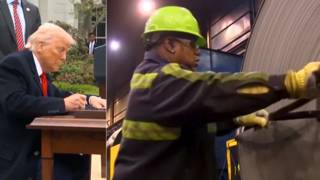
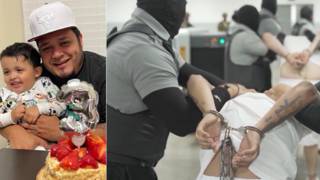
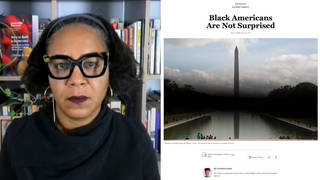
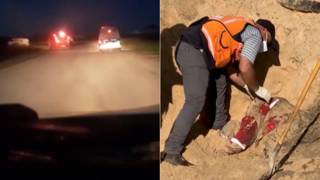






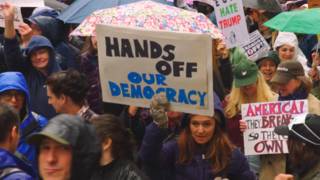
Media Options